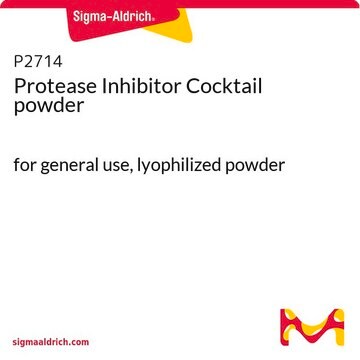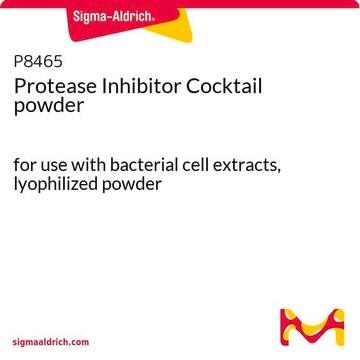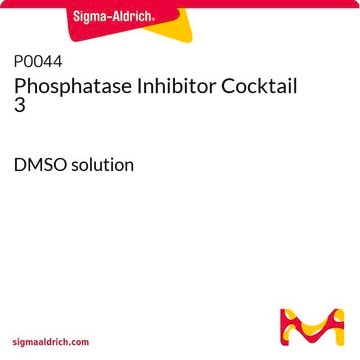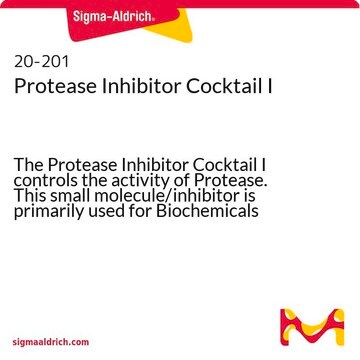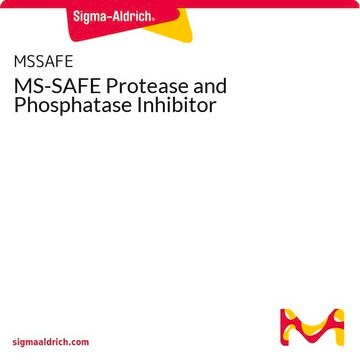This product can be used in rat tissue homogenate. It already contains serine and cysteine protease inhibitors. Note that PMSF has a short half-life in aqueous solutions, specifically 55 minutes at 25°C and pH 7.5.
P8340
Protease Inhibitor Cocktail
DMSO solution, for the inhibition of serine, cysteine, acid proteases and aminopeptidases, for use with mammalian cell and tissue extracts, DMSO solution
Sinónimos:
Mezcla de inhibidor de proteasas
About This Item
Productos recomendados
Nombre del producto
Cóctel de inhibidores de proteasas, for use with mammalian cell and tissue extracts, DMSO solution
origen biológico
bovine lung
Nivel de calidad
Formulario
DMSO solution
solubilidad
water: soluble
temp. de almacenamiento
−20°C
¿Está buscando productos similares? Visita Guía de comparación de productos
Categorías relacionadas
Descripción general
Especificidad
Aplicación
Proporciona protección contra la actividad enzimática endógena en extractos celulares y de tejidos
Acciones bioquímicas o fisiológicas
Características y beneficios
Conservación estable: se suministra como disolución en DMSO, lo que permite su conservación a largo plazo a -20°C
Rendimiento uniforme: disolución lista para usar
Componentes
Aprotinina
Bestatina
E-64
Leupeptina
Pepstatina A
Precaución
Nota de preparación
Producto relacionado
también adquirido normalmente con este producto
Palabra de señalización
Warning
Frases de peligro
Consejos de prudencia
Clasificaciones de peligro
Eye Irrit. 2 - Skin Irrit. 2
Código de clase de almacenamiento
10 - Combustible liquids
Clase de riesgo para el agua (WGK)
WGK 2
Punto de inflamabilidad (°F)
188.6 °F - closed cup
Punto de inflamabilidad (°C)
87 °C - closed cup
Elija entre una de las versiones más recientes:
Certificados de análisis (COA)
¿No ve la versión correcta?
Si necesita una versión concreta, puede buscar un certificado específico por el número de lote.
¿Ya tiene este producto?
Encuentre la documentación para los productos que ha comprado recientemente en la Biblioteca de documentos.
Los clientes también vieron
Contenido relacionado
Research evaluating immune checkpoints may help identify those likely to benefit from PD-1/PD-L1 immunotherapy and reveal new immunotherapy targets for future investigation. See how the MILLIPLEX® Human Immuno-Oncology Checkpoint Protein Panel 2 was used to multiplex immune checkpoint molecules for NSCLC research.
Research evaluating immune checkpoints may help identify those likely to benefit from PD-1/PD-L1 immunotherapy and reveal new immunotherapy targets for future investigation. See how the MILLIPLEX® Human Immuno-Oncology Checkpoint Protein Panel 2 was used to multiplex immune checkpoint molecules for NSCLC research.
Research evaluating immune checkpoints may help identify those likely to benefit from PD-1/PD-L1 immunotherapy and reveal new immunotherapy targets for future investigation. See how the MILLIPLEX® Human Immuno-Oncology Checkpoint Protein Panel 2 was used to multiplex immune checkpoint molecules for NSCLC research.
Research evaluating immune checkpoints may help identify those likely to benefit from PD-1/PD-L1 immunotherapy and reveal new immunotherapy targets for future investigation. See how the MILLIPLEX® Human Immuno-Oncology Checkpoint Protein Panel 2 was used to multiplex immune checkpoint molecules for NSCLC research.
-
Can this product be used for IL-6 detection using ELISA in rat tissue Homogenate? Can it be used along with PMSF without creating any problem in the assay?
1 answer-
Helpful?
-
-
How long is the protease inhibitor cocktail stable at room temperature?
1 answer-
This product ships without wet or dry ice and is stable for up to two weeks at ambient temperatures. The long-term stability of this material at room temperature has not been determined. The recommended long-term storage temperature is -20°C.
Helpful?
-
-
Can we dilute it in water? The experiment I plan to do will require 100ul of Protease inhibitor per vial, and I have more than 50 samples to run.
1 answer-
This product is ready to use and should be diluted into the lysis buffer.
Helpful?
-
-
Is the protease cocktail P8340 supplied as a 100X solution or a 1X solution?
1 answer-
This cocktail is essentially a 100X preparation. One milliliter of this solution is sufficient for the inhibition of endogenous enzymes found in 100 mL of lysate. Please see the link below to review this and additional information available in the product datasheet:
https://www.sigmaaldrich.com/deepweb/assets/sigmaaldrich/product/documents/107/629/p8340dat-ms.pdfHelpful?
-
-
What is the stock concentration of the Protease Inhibitor Cocktail P8340? Is it 1x or 100x?
1 answer-
The concentration of inhibitors in this product is the following:AEBSF, 104 mMAprotinin, 0.085 mMBestatin, 4 mME-64, 1.4 mMLeupeptin, 2 mMPepstain A, 1.5 mM.
Helpful?
-
-
Do we need to add PMSF as well along with this cocktail? I intend to use this for RIPA buffer
1 answer-
PMSF is a serine protease inhibitor. You can certainly add along with the cocktail if needed.
Helpful?
-
-
What is the working concentration if adding to the blood?
1 answer-
The recommended amount to use is 1:100 (v:v) directly to the whole blood, but one has to take into consideration that this will disrupt the coagulation cascade. If it is a concern, the protease inhibitor cocktail should be added after separation of the blood components. In the serum use at the same concentration as for blood, 1:100 (v:v)
There are articles citing this product when using blood samples. 1-100 was used in both articles:
https://www.ncbi.nlm.nih.gov/pmc/articles/PMC7346264/
https://www.ncbi.nlm.nih.gov/pmc/articles/PMC2722770/Helpful?
-
-
How long can this product be stored at -20C?
1 answer-
This product is not assigned an expiration date. It is assigned a recommended retest date of approximately 4 years after the quality release date. A recommended retest date is the period of time during which the product is expected to remain within established stability specifications, provided that it has been stored under defined conditions. The retest date can be found in the lot specific Certificate of Analysis. After the Retest Date, product samples should be examined to ensure that the product is still in compliance with the established specifications. For more information, you may access the "Product Dating Information" document under "ADDITIONAL USEFUL DOCUMENTS ABOUT OUR PRODUCTS" at the bottom of the Quality Services page with this link: https://www.sigmaaldrich.com/US/en/life-science/quality-and-regulatory-management/quality-services.
Please see the link below to review a sample Certificate of Analysis:
https://www.sigmaaldrich.com/certificates/sapfs/PROD/sap/certificate_pdfs/COFA/Q14/P8340-1ML0000227406.pdfHelpful?
-
-
Does Product P8340, Protease Inhibitor Cocktail, contain any chelators or EDTA?
1 answer-
This product does not contain any metal chelators.
Helpful?
-
-
Is there anything in Product P8340, Protease Inhibitor Cocktail, that will cause downstream problems with RT-PCR?
1 answer-
While the product should not cause any downstream problems with RT-PCR, we would advise to clean up the reaction with either DMN10 (GenElute™ Direct mRNA Miniprep Kit) or T9424 (TRI Reagent®) for purification.
Helpful?
-
Active Filters
Nuestro equipo de científicos tiene experiencia en todas las áreas de investigación: Ciencias de la vida, Ciencia de los materiales, Síntesis química, Cromatografía, Analítica y muchas otras.
Póngase en contacto con el Servicio técnico